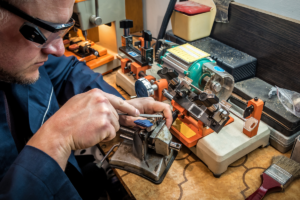Have you ever been locked out of your car or home? You probably realized just how much we depend on locksmiths to save the day. But being a modern locksmith isn’t just about having a few tools in a box. It’s a blend of skill, technology, and the right equipment. Let’s explore what today’s locksmiths really need to succeed.
Modern locksmithing is no longer confined to manual tools and traditional skills. The profession has expanded into a dynamic blend of craftsmanship and technological innovation. As smart homes, biometric locks, and electronic security systems become more prevalent, locksmiths must evolve to keep pace. Mastering these advanced systems requires continuous learning and a willingness to embrace new tools and techniques.
The demands on locksmiths today are higher than ever. Clients expect quick, efficient service combined with expertise in handling high-tech systems. Whether installing a digital lock, troubleshooting a malfunctioning keypad, or assisting with emergency access, locksmiths must be equipped with the knowledge and tools to handle any scenario.
In this article, we’ll explore the essential skills, tools, and technologies that define the modern locksmith. From advanced lock-picking kits to cutting-edge software for key duplication, we’ll uncover what it truly takes to excel in this vital yet challenging profession. Let’s dive into the world of locksmithing and see how this trade has adapted to meet the security needs of the 21st century.
1. The Essential Hand Tools Every Locksmith Needs
Locksmithing starts with the basics: hand tools that never go out of style.
- Wrenches and Screwdrivers: These are indispensable for removing lock assemblies and disassembling lock components. Precision screwdrivers, in particular, are a must for working on delicate mechanisms.
- Pliers and Pinning Kits: Locksmiths use pliers to adjust or remove small parts, while pinning kits help them rekey locks quickly and efficiently.
2. Power Tools That Make Locksmithing Efficient
Time is money, especially when responding to emergency calls. Power tools come to the rescue.
- Cordless Drills: Perfect for drilling out broken locks or installing new ones, cordless drills are a locksmith’s best friend.
- Rotary Tools for Precision Work: These tools allow locksmiths to file or grind small components with incredible accuracy.
3. Key Cutting Machines: A Must-Have
Every locksmith shop needs key cutting machines to duplicate or create keys.
- Manual Key Cutters: Affordable and reliable, these machines are ideal for everyday use.
- Advanced Automatic Key Cutters: For more complex or high-security keys, automatic cutters streamline the process and reduce human error.
4. Lock Picking Tools for Professionals
No locksmith toolkit is complete without lock picking tools.
- Single Pin Pick Tools: Used for unlocking traditional locks one pin at a time.
- Tension Wrenches: Provide the necessary torque to manipulate lock pins successfully.
5. The Role of Bump Keys in Locksmithing
Bump keys are often misunderstood, but they have their place.
- How They Work: Bump keys use force to align all the pins inside a lock simultaneously.
- Ethical Use of Bump Keys: Professional locksmiths only use these tools with permission or during training.
6. Tools for Electronic and Smart Locks
With the rise of smart homes, locksmiths now work on digital and electronic locks.
- Digital Lock Decoders: These devices identify the code or bypass electronic locks.
- Smart Lock Programming Kits: Locksmiths use these to install or troubleshoot smart lock systems.
7. Inspection Tools to Assess Security
Diagnosing a problem is half the battle, and inspection tools make it easier.
- Bore Scopes: Allow locksmiths to inspect the internal components of a lock without dismantling it.
- Security Key Gauges: Measure key depths and alignments to identify issues.\
8. Vehicle Locksmithing Tools
Being locked out of a car is common, and locksmiths need specialized tools for this job.
- Slim Jims and Wedge Kits: Help unlock cars without damaging doors or windows.
- Transponder Key Programming Devices: Necessary for programming modern car keys equipped with security chips.
9. Safes and Vault Opening Tools
Safe work requires specialized tools and expertise.
- Drill Rigs: Used to penetrate high-security safes with precision.
- Safe Scopes: Allow locksmiths to see inside a safe and identify the locking mechanism.
10. Software Solutions for Locksmiths
Software tools help streamline the business side of locksmithing.
- Inventory Management Tools: Keep track of tools and materials.
- Customer Scheduling Apps: Ensure timely responses to client requests.
11. Portable Workstations and Toolboxes
Mobility is key for many locksmiths.
- Compact Toolkits: Store essential tools for on-the-go jobs.
- Mobile Locksmith Vans: These are fully equipped workstations that travel to the client.
12. Maintenance Tools for Longevity
Well-maintained tools last longer and perform better.
- Lubricants and Cleaners: Prevent rust and keep locks functioning smoothly.
- Calibration Tools: Ensure key-cutting machines and other devices remain accurate.
13. Training and Reference Materials
Locksmithing requires continuous learning.
- Locksmith Manuals: Offer step-by-step guidance for various lock types.
- Online Training Platforms: Provide up-to-date knowledge on tools and techniques.
14. Safety Gear for Locksmiths
Safety should never be an afterthought.
- Protective Gloves and Glasses: Shield hands and eyes from debris and sharp tools.
- Noise-Canceling Ear Protection: Protect hearing during noisy tasks like drilling.
15. Trends Shaping the Future of Locksmith Tools
Technology is revolutionizing locksmithing.
- AI-Powered Lock Decoders: Use artificial intelligence to crack complex locks.
- Integration with IoT Devices: Future tools will likely work seamlessly with smart home systems.
Locksmithing is more than just a trade—it’s an art. Having the right tools not only makes the job easier but also ensures customer satisfaction. Whether it’s a simple lockpick or a high-tech programming device, staying updated is the key to success.
In conclusion, locksmithing has evolved from a simple craft into a highly specialized and technologically advanced profession. The tools and skills that once focused solely on manual lock-and-key systems have expanded to include digital, biometric, and high-tech security solutions. As a result, modern locksmiths must not only master traditional techniques but also stay at the forefront of technological advancements to remain competitive and effective.
Investing in the right tools and continuously updating one’s knowledge is crucial to success in today’s locksmithing world. Whether it’s through advanced software for key duplication, sophisticated programming devices for smart locks, or precision tools for high-security systems, the right equipment ensures locksmiths can provide quick, accurate, and reliable service. Furthermore, staying updated on emerging security trends and technologies allows locksmiths to anticipate customer needs and offer cutting-edge solutions.
The profession of locksmithing is far from static—it continues to evolve with the ever-changing landscape of security. Those who embrace new technologies, refine their skills, and invest in quality tools will continue to thrive in this indispensable field, offering peace of mind and security to clients in every situation.

I’m Marcel Brandt, a locksmith with over 15 years of experience. I specialize in modern security solutions and love sharing tips to help fellow locksmiths succeed in their careers.




